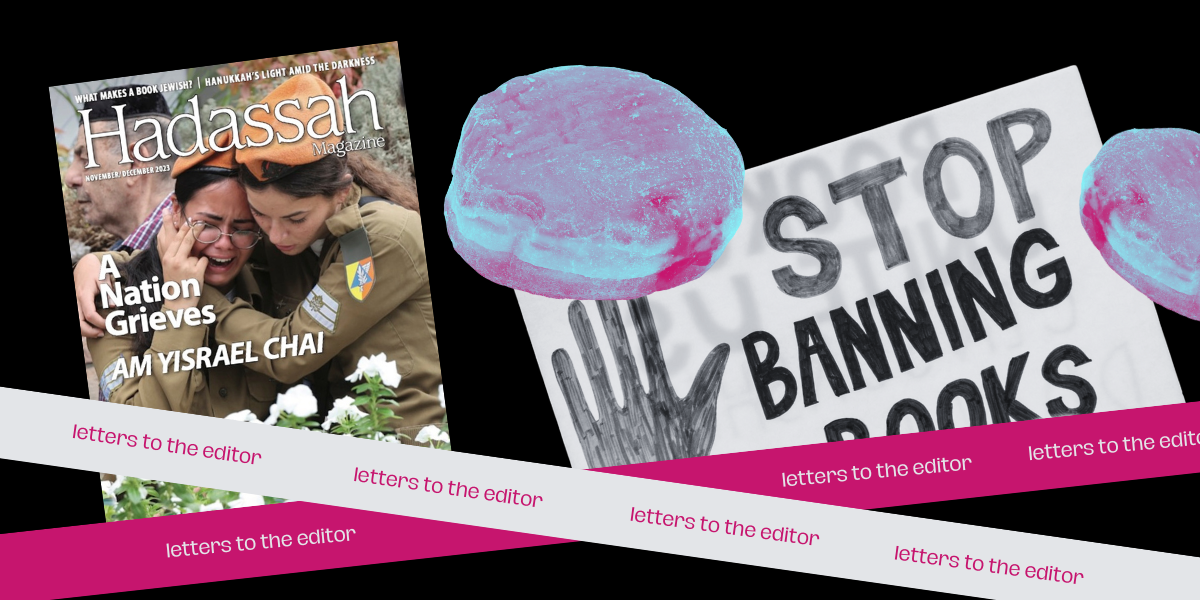Hadassah
Letters to the Editor
Book Banning and a Healthier Hanukkah

We want to hear from you! Please email letters to the editor to letters@hadassah.org.
‘Cancel Culture’ Is Not the Same as Banning
As a Hadassah life member and an editor of many books for teens currently being challenged and banned, I was encouraged to read your coverage of these devastating book bans in “And the Ban Played On” in the November/December 2023 issue. However, I want to clarify the distinction between actual censorship and the separate issue of criticizing books containing racist content—described by many people as “cancel culture.” The article notes that “the publisher” of Dr. Seuss’s books (a publisher for which I work, but I had no involvement with the Dr. Seuss books) ceased publishing several titles. In fact, it was the Seuss estate that made this choice, a key distinction because it’s not censorship for an owner of a copyright to decide to alter or withhold their own books.
This conflation of actual bans springing up across the country with people speaking out to criticize books that may portray negative stereotypes of characters from marginalized identities is itself quite dangerous. I hear people equate “cancel culture” with book bans in part because of misinformation like this about who makes the decisions to edit or not publish a book, or even who makes the decision to carry a book on shelves. A bookseller deciding not to carry a title because they deem it racist is an ocean apart from a law that restricts the bookseller’s rights to decide what books to carry and sell.
Liesa Abrams
Nutley, N.J.
I want to make one addition to the feature about book banning. Illinois was the first state to ban censorship of books, preceding California. The Illinois legislature and Governor J.B. Pritzker, who is Jewish, led the way on this particular issue. The more that alternatives to censorship are recognized and given positive acknowledgement, the more likely it is that other states will follow.
Deborah Pizer Hermalyn
Naples, Fla.
A Healthier Hanukkah
While your tribute to Dunkin’ Donuts founder William Rosenberg (“At Hanukkah, It’s Time to Make the Donuts,” November/December issue) is a laudable commemoration of American Jewish innovation, I am disturbed by your applause for a “chemical confection.” A typical Dunkin’ jelly donut contains over 50 ingredients, many of them processed and artificial.
Since the time of Maimonides, Jews have enjoyed special Hanukkah foods fried in oil. Yet our ancestors did not know frying is unhealthy, did not have refined sugar and did not know sugar is a cause of cancer. Jewish traditions evolve according to culture and time. Therefore, in the same creative spirit that made Rosenberg a success, let’s update Hanukkah customs and find healthier ways to celebrate. Personally, along with my menorah, I’ll be putting out olive tapenade and winter pesto made with olive oil, parsley and walnuts.
Yael Bernhard
Phoenicia, N.Y.
Authors For Israel
Thank you, Hadassah Magazine, for the focus on Jewish books and authors in the November/December issue. The magazine’s Guide to Jewish Literature gave me another opportunity to introduce my book, Moe Fields: The Special Bond Between Fathers and Sons, which relates my dad’s story of becoming a boxer during the Depression to support his parents.
I’ve decided to donate all book earnings over the next quarter to Israel and I’m asking all the authors and publishers featured in Hadassah Magazine to join me in solidarity with Israel. As writers, we create stories in hopes of inspiring change in the world. Now is the time to take the added step of donating profits to help Israel. My father-in-law fought in Israel’s War of Independence and my wife was born in Ramat Gan. Today, my cousins hear the missiles north of Tel Aviv. I also do this to honor my parents, who taught me the responsibility of tzedakah. Only Israel matters now.
Stuart Goldstein
Monroe Township, N.J.










 Facebook
Facebook Instagram
Instagram Twitter
Twitter
Leave a Reply